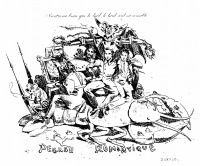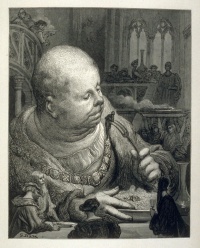Ugliness
From The Art and Popular Culture Encyclopedia
|
"I never heard of "Uglification,"' Alice ventured to say. 'What is it?'"--Alice's Adventures in Wonderland (1865) by Lewis Carroll "Let the ceremony Take place of the uglification of the Queen." --Oedipus Tyrannus; or, Swellfoot the Tyrant, published anonymously; a burlesque on the trial of Queen Caroline by Percy Bysshe Shelley "But an important caution must here be entered. Natives speak with such horror about the various forms of ugliness, and repulsion is so clearly discernible in their behaviour that there is no temptation to doubt their word. In fact, in games and amusements, an albino, an idiot, or a man afflicted with skin disease is so completely left out of the fun that his loneliness and isolation wake pity even in the frigid heart of an ethnographer. Thus observation fully confirmed the verbal proposition in which all the natives are agreed, that all such people are absolutely debarred from sexual intercourse and that they have to resort to solitary means of satisfaction." --The Sexual Life of Savages (1929) by Bronisław Malinowski |

Left to right: Petrus Borel, Victor Hugo, and Alexandre Dumas
Its motto reads "Only the ugly is beautiful, only the ugly is likeable."


.png)
|
Related e |
|
Featured: |
Ugliness is a property of a person or thing that is unpleasant to look upon. It often indicates that something provokes revulsion or horror. The term is commonly used in reference to human appearance. The opposite of ugliness is beauty.
Some argue that ugliness is a matter of subjective aesthetics, claiming that one person may perceive to be beautiful something that another may find ugly (as referenced in the popular phrase Beauty is in the eye of the beholder). However the predominant view in the scientific fields is that human ugliness is part of sexual selection and an indicator of poor genetic or physical health.
Although usually thought of in terms of a lack of physical beauty, the property of ugliness, like beauty, may also be ascribed to other phenomena, such as music, literature, human behavior, and so on.
In the 19th century the 'cult of ugliness' developed into a new aesthetic category.
Contents |
In people
Unattractiveness or ugliness is the degree to which a person's physical features are considered aesthetically unfavorable.
People who appear ugly to others suffer well-documented discrimination, earning 10 to 15 percent less per year than similar workers, and are less likely to be hired for almost any job, but lack legal recourse to fight discrimination.
Socrates (see "The Phenomenology of Ugly", 2010) is said to have used his ugliness as a philosophical touchstone, concluding that philosophy can save us from our outward ugliness. Famous in his own time for his perceived ugliness, Abraham Lincoln was described by a contemporary: "to say that he is ugly is nothing; to add that his figure is grotesque, is to convey no adequate impression." However, his looks proved to be an asset in his personal and political relationships, as his law partner William Herndon wrote, "He was not a pretty man by any means, nor was he an ugly one; he was a homely man, careless of his looks, plain-looking and plain-acting. He had no pomp, display, or dignity, so-called. He appeared simple in his carriage and bearing. He was a sad-looking man; his melancholy dripped from him as he walked. His apparent gloom impressed his friends, and created sympathy for him—one means of his great success."
Terminology
Ugliness is a property of a person or thing that is unpleasant to look upon and results in a highly unfavorable evaluation. To be ugly is to be aesthetically unattractive, repulsive, or offensive. There are many terms associated with visually unappealing or aesthetically undesirable people, including hideousness and unsightliness, more informal terms such as turn-offs.
History
Jean-Paul Sartre had a lazy eye and a bloated, asymmetrical face, and he attributed many of his philosophical ideas to his lifelong struggle to come to terms with his self-described ugliness. Socrates also used his ugliness as a philosophical touch point, concluding that philosophy can save a person from their outward ugliness. Famous in his own time for his perceived ugliness, Abraham Lincoln was described by a contemporary: "to say that he is ugly is nothing; to add that his figure is grotesque, is to convey no adequate impression." However, his looks proved to be an asset in his personal and political relationships, as his law partner William Herndon wrote, "He was not a pretty man by any means, nor was he an ugly one; he was a homely man, careless of his looks, plain-looking and plain-acting. He had no pomp, display, or dignity, so-called. He appeared simple in his carriage and bearing. He was a sad-looking man; his melancholy dripped from him as he walked. His apparent gloom impressed his friends, and created sympathy for him—one means of his great success."
Prejudice
Discrimination or prejudice against unattractive people is sometimes referred to as lookism or cacophobia (also aschimophobia), and if it is a result of one's disfigurement, ableism. Teratophobia is an aversion or fear of people who appear monstrous, have blemishes or are disfigured. When such an aversion is coupled with prejudice or discrimination, it may be viewed as a form of bullying. Some research indicates a sentencing disparity where unattractive people tend to get heavier prison sentences than attractive people.
Legality
There are some jurisdictions that already make it illegal to discriminate on the basis of immutable forms of aesthetic appearance, including the Australian state of Victoria, wherein lookism was made illegal in 1995.
Films related to "ugliness"
- The Beauty and the Beast, 1947, Jean Cocteau
- Freaks (1932) by by Tod Browning
- The Elephant Man (1980) by David Lynch
- Shrek (2001) by Andrew Adamson, Vicky Jenson
Namesakes
- The Good, the Bad and the Ugly
- To Hell with the Ugly (1948) by Boris Vian
- "Ugly Woman" (1933) a traditional calypso song
- Ugly, Dirty and Bad (1976) by Ettore Scola
Ugliness in Northern Renaissance
- The Ugly Duchess (1525-30) by Quentin Matsys
- Ugly Renaissance babies[1]
Contemporary photographers fascinated with ugliness
The sublime
The sublime may inspire horror, but one receives pleasure in knowing that the perception is a fiction. Burke's concept of the sublime was a stark contrast to the classical notion of aesthetic quality in Plato's Philebus, Ion, and Symposium, and suggested ugliness as an aesthetic quality.
Cult of ugliness
Cult of ugliness refers to a relatively new phenomenon, coinciding with modern art, in the history of art theory: the rejection of classical beauty ideals and the embracing of ugliness.
Uglinesses
Bibliography
- The Aesthetics of the Ugly (1853) by German philosopher Karl Rosenkrantz
- On Ugliness (2007) by Umberto Eco
- The Ugly Woman: Transgressive Aesthetic Models in Italian Poetry from the Middle Ages to the Baroque
See also



